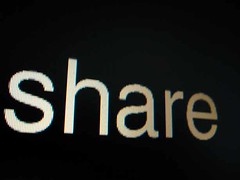 Ever since I delved into educational blogging, a strong supporter of my efforts has been Jo McLeay, a secondary English teacher from Melbourne. She has a great name for her blog, "The Open Classroom." It's a great title because it evokes images of transparency and free dialogue. I'm pretty sure that's what Jo strives for and it brings me to the point that in order to have an open classroom in today's existing school paradigm, I would assume it would need to be led by an open educator.
Ever since I delved into educational blogging, a strong supporter of my efforts has been Jo McLeay, a secondary English teacher from Melbourne. She has a great name for her blog, "The Open Classroom." It's a great title because it evokes images of transparency and free dialogue. I'm pretty sure that's what Jo strives for and it brings me to the point that in order to have an open classroom in today's existing school paradigm, I would assume it would need to be led by an open educator.
What's an open educator?
It could be interpreted in several different ways but I'd want to consider this concept in the context of the digital age. For me, an open educator is someone prepared to share their practice, their resources and ideas, locally and globally, to known colleagues and unknown peers. In short, they are committed to an open professional existence.
At my school, structures like co-planning partners and learning teams are all designed to foster the openness and transparency required to move whole school practice forward. There are barriers in that sort of collaboration as not all teachers' mindsets lend themselves to teamwork or the pursuit of common goals. Sharing of resources and professional practices voluntarily outside of these group structures can be a sporadic, incidental or scarce occurrence. An example of this came in a conversation I had with a ICT coordinator at a local high school who had been trialling an expansive Learner Management System where teachers could post whole courses online and house their resources in an environment where sharing was as simple as providing an open folder for others to peruse. He said that teachers were loathe to put much up because they didn't want others "stealing'' their "intellectual property." I can think back to the many primary school teachers who guarded their precious resource folders jealously for the same reasons. In my opinion, being open doesn't come naturally to the average teacher - it takes a conscious choice to do so.
Many of the students we teach are used to being open, especially online - sometimes we (the generation before) think that they are being much too open - and are used to be under surveillance via mobile phones, computer histories and security cameras. Being open is not an issue for them and if the oldies don't understand what's going on and aren't savvy enough to check out the online spaces where the information is displayed, well, that's a bit of a bonus for the kids. And at a certain age, students feel that they have a strong grip on dictating how their open web presence can be displayed or portrayed. I think it's actually a hard sell talking cybersafety to anyone over the age of twelve because a large proportion of these students have already established their online identity and have chatted and Piczoed and MySpaced large slabs of their life and the details involved onto the web. I can sell my tales of caution and care to my slightly younger class because at best, they've only dabbled with some of the technology and are more willing to listen to and consider the risks involved. Photos, profiles, friends' lists, detailed angst - it's easily found and it's a real cultural shift that a lot of educators are struggling to fathom, let alone deal with.
Here's what we do know. There are risks involved in being online. There are risks in being open. There are risks in being open online.
But the open online educator has a greater chance of being a powerful role model for positive, constructive use of the web by students than the closed offline educator. Because where does the latter get their direction? By using a step by step lesson plan from NetAlert? If I'm planning a unit of work based on responsible use of the internet, do I rely solely on one site that I've been recommended? What about multiple points of view? If I'm an open educator who has online presence I can easily gain those alternative perspectives by leveraging my network, using resources other open colleagues have left to be shared via their del.icio.us tags, their wikis, their YouTube videos. Before too long, I have the necessary digital resources to enable my class to cover the topic and its associated issues effectively.
Open educators also work smarter. By making their content and resources open to be shared by others, they can access other teachers' content and resources in return. The wheel doesn't get reinvented in every classroom - a re-mix culture between open educators can emerge where you can take, add, alter and re-share flexible resources around the globe. The closed educator misses out on that.
I'm guessing that if you are reading this, you already are well qualified as an open educator. The problem is - what do we do about the rest of our profession?
Attribution: Image: 'share' by dmihneawww.flickr.com/photos/15282287@N00/336733100
